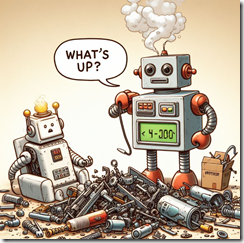Flailing and Theorizing: The Internet Is Dead. Swipe and Chill
February 2, 2024
 This essay is the work of a dumb dinobaby. No smart software required.
This essay is the work of a dumb dinobaby. No smart software required.
I do not spend much time with 20 somethings, 30 something, 40 somethings, 50 somethings, or any other somethings. I watch data flow into my office, sell a few consulting jobs, and chuckle at the downstream consequences of several cross-generation trends my team and I have noticed. What’s a “cross generational trend”? The phrase means activities and general perceptions which are shared among some youthful college graduates and a harried manager working in a trucking company. There is the mobile phone obsession. The software scheduler which strips time from an individual with faux urgency or machine-generated pings and dings. There is the excitement of sports events, many of which may feature scripting. There is anomie or the sense of being along in a kayak carried to what may be a financial precipice. You get the idea.
Now the shriek of fear is emanating from online sources known as champions of the digital way. In this short essay, I want to highlight one of these; specifically, “The Era of the AI-Generated Internet Is Already Here: And It’s Time to Talk about AI Model Collapse.” I want to zoom the conclusion of the “real” news report and focus on the final section of the article, “The Internet Isn’t Completely Doomed.”
Here we go.
First, I want to point out that communication technologies are not “doomed.” In fact, these methods or techniques don’t go away. A good example are the clay decorations in some homes which way, “We love our Frenchie” or an Etsy plaque like this one:
Just a variation of a clay tablet produced in metal for an old-timey look. The communication technologies abundant today are likely to have similar stickiness. Doom, therefore, is Karen rhetoric in my opinion.
Second, the future is a return to the 1980s when for-fee commercial databases were trusted and expensive sources of electronic information. The “doom” write up predicts that content will retreat behind paywalls. I would like to point out that you are reading an essay in a public blog. I put my short writings online in 2008, using the articles as a convenient archive. When I am asked to give a lecture, I check out my blog posts. I find it a way to “refresh” my memory about past online craziness. My hunch is that these free, ad-free electronic essays will persist. Some will be short and often incomprehensible items on Pinboard.in; others will be weird TikTok videos spun into a written item pumped out via a social media channel on the Clear Web or the Dark Web (which seems to persist, doesn’t it?) When an important scientific discovery becomes known, that information becomes findable. Sure, it might be a year after the first announcement, but those ArXiv.org items pop up and are often findable because people love to talk, post, complain, or convert a non-reproducible event into a job at Harvard or Stanford. That’s not going to change.
A collapsed AI robot vibrated itself to pieces. Its model went off the rails and confused zeros with ones and ones with zeros. Thanks, MSFT Copilot Bing thing. How are those security procedures today?
Third, search engine optimization is going to “change.” In order to get hired or become famous, one must call attention to oneself. Conferences, Zoom webinars, free posts on LinkedIn-type services — none of these will go away or… change. The reason is that unless one is making headlines or creating buzz, one becomes irrelevant. I am a dinobaby and I still get crazy emails about a blockchain report I did years ago. (The somewhat strident outfit does business as IGI with the url igi-global.com. When I open an email from this outfit, I can smell the desperation.) Other outfits are similar, very similar, but they hit the Amazon thing for some pricey cologne to convert the scent of overboardism into something palatable. My take on SEO: It’s advertising, promotion, PT Barnum stuff. It is, like clay tablets, in the long haul.
Finally, what about AI, smart software, machine learning, and the other buzzwords slapped on ho-hum products like a word processor? Meh. These are short cuts for the Cliff’s Notes’ crowd. Intellectual achievement requires more than a subscription to the latest smart software or more imagination than getting Mistral to run on your MacMini. The result of smart software is to widen the gap between people who are genuinely intelligent and knowledge value creators, and those who can use an intellectual automatic teller machine (ATM).
Net net: The Internet is today’s version of online. It evolves, often like gerbils or tribbles which plagued Captain Kirk. The larger impact is the return to a permanent one percent – 99 percent social structure. Believe me, the 99 percent are not going to be happy whether they can post on X.com, read craziness on a Dark Web forum, pay for an online subscription to someone on Substack, or give money to the New York Times. The loss of intellectual horsepower is the consequence of consumerizing online.
This dinobaby was around when online began. My colleagues and I knew that editorial controls, access policies, and copyright were important. Once the ATM-model swept over the online industry, today’s digital world was inevitable. Too bad no one listened when those who were creating online information were ignored and dismissed as Ivory Tower dwellers. “Doom”? No just a dawning of what digital information creates. Have fun. I am old and am unwilling to provide a coloring book and crayons for the digital information future and a model collapse. That’s the least of some folks’s worries. I need a nap.
Stephen E Arnold, February 1, 2024




